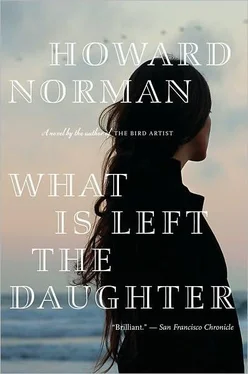"Yep, once was too often for my taste," Cornelia said. "My attitude is, serve them something to eat, let them pay for it, and don't tell them a goddamn thing. If that goes smoothly, fine. But if they don't want anything to eat, I say the townspeople aren't here to provide a dog-and-pony show." One morning I was in the bakery, this was in August 1946, I think. A middle-aged couple — Cornelia said they were from Halifax — were just leaving. They had unfriendly expressions on their faces, no doubt because they'd dealt with unfriendly Cornelia. When I sat down at a table, Cornelia said, "I'd bet that in Halifax a tour of houses people got murdered in would take longer than the five minutes it'd take in our little village, don't you think?"
"I'd bet whatever you'd bet, Cornelia, and add ten dollars," I said.
"Besides which, that man and wife who just left didn't order as much as a scone to share between them. You know what I offered them gratis, though?"
"No, what?"
"Offered to show them the door."
You may wonder, Marlais, about the history behind Marcus and Uli Mohring's coming to visit. Well, in May of 1947 Tilda had received a letter from Uli Mohring, in which she wrote, "My husband and I would like to see Dalhousie University, where Hans was so happy, and the village of Middle Economy." Tilda wrote them back directly. When a second letter arrived stating their travel dates, Tilda told them to Reverend Witt, which, in terms of getting the news around, was like having their plans broadcast on the radio.
Mr. and Mrs. Mohring's visit fell on a weekend. They attended church. Reverend Witt acknowledged them from the pulpit but didn't refer to their son in his sermon. No need to, since Hans's murder was no doubt what all the parishioners had in their thoughts, no matter what the subject of the sermon was. "Certainly, seeing them in our church caused a once-in-a-lifetime bunch of emotions," Mrs. Oleander said to Cornelia the next morning in the bakery. "And I was shoulder to shoulder with Mrs. Uli Mohring, third pew from the front. That's not something I'm likely to forget."
In the kitchen above the bakery late that Sunday afternoon, October 17, Tilda told me that Uli and Marcus Mohring had made an impression as nice people. "They're taking naps now," she said. "Mrs. Mohring is fifty-nine and Mr. Mohring's sixty-three. They have accents much thicker than Hans's was. Following the sermon and hymns, right there in the pews, they sat with twenty or so people, maybe more. They actually apologized — can you believe it? — if anyone was made ill at ease by them. Here's what else they said: 'It was very difficult traveling here. We had third-class steamer passage. But we only wanted to see where our son spent his last days. We wanted the opportunity to tell you what a good person he was. He was a good, serious student. We received a letter from Hans. It took a long time to reach us. It said he was married. That he married a Canadian young woman. We hoped to meet her.' And when they passed around photographs of Hans as a young boy, Mrs. Oleander got choked up. So did Reverend Witt. So did Charlotte Butler, from the sewing shop, and her husband, George, got choked up, too." Tilda stopped talking a moment in order to catch her breath. "And those aren't exactly sentimental types, the Butlers especially. Goodness, they were sobbing up to the rafters, the Butlers were."
"You don't have to tell me any of this, Tilda," I said.
"There is more to tell, but if it's all the same to you, I'll keep it to myself. One other thing, Wyatt. I read Uli and Marcus my obituary, and they helped me write it better."
"Write it better how?"
"Details from Hans's childhood. Some other facts, too. They want to see that their son is well served. Reverend Witt's going to finally put it in the church bulletin. Sunday next, he promised. Better late than never, I suppose."
"Did they ask about—"
"They already knew who'd done what, from my original letter, back from when you were in Rockhead. No, they only wanted to speak about their son and meet me." She stared out the window. "Hans looked a lot like his parents, my goodness. He had the same way of walking as his father, same eyes and eyebrows, but his mother's mouth and smile. And Hans was taller than his dad."
"Difficult, I bet, for you to see Hans in them like that."
"No. You have no idea how happy it made me."
"How did they take to Marlais?"
Tilda didn't respond right away. Instead, she got up and steeped a pot of tea. I went into the bedroom and found you sitting on the bed, Marlais. You had sheets of paper spread out, and you were drawing funny faces of people, though some had cat whiskers. I put Chopin on the phonograph and went to the kitchen. Tilda set a cup of tea in front of me. She poured her own cup, carried it to the table and sat across from me.
"We four sat together in the kitchen of my house — me, Marlais, Mr. and Mrs. Mohring," she said. "And Mrs. Mohring held Marlais on her lap, and they were peas in a pod, let me tell you. I never heard Marlais so chatty. They drew with crayons on napkins, at first nothing but silly likenesses of each other. But then Uli asked Marlais to draw a picture of her family. And Wyatt, that picture turned out to include just me and Marlais."
"And I was nowhere in sight — on that napkin."
"Well, your car was there."
"Maybe that meant I was in the shed working."
"That's anyone's guess."
Tilda sipped her tea slowly and we listened to the music. You walked into the kitchen then, Marlais, and showed us a drawing you'd done of some boats and a big sun overhead, with long sun rays sticking out, but only at the top like porcupine quills. You were in stocking feet and had on a button-up shirt and overalls.
"That's wonderful," your mother said, and gave you a hundred kisses, you giggling the whole time. When you went back to the bedroom, Tilda said, "I wanted to talk with Uli Mohring alone, so Marcus took Marlais for a walk."
"So you and Mrs. Mohring had a nice talk, did you?" I said.
"Talked and talked, yes we did."
"Well, good."
"The thing is, Wyatt, at one point Uli Mohring smoothed out the napkin on the table — you know, the one with Marlais's family portrait on it. 'Tilda, dear,' she said. 'You have not once mentioned the father of this lovely child. Why not come live with us in Denmark?'"
"That was direct."
"Well, if something's to the point, a point's been made."
"And you said, on my behalf?"
"It's not what I said, Wyatt, it's what I thought. What I thought was, I'd be surprised if I couldn't fit everything Marlais and I would need in my mother's wardrobe trunk."
You know, Marlais, so much is difficult to tell you, but it's the truth.
I never believed in the phrase "it all comes back to me now," because not all of anything that happened in the past comes back whole cloth. But I do clearly remember that scarcely five minutes after we brought you home from hospital, you fell asleep in the crib I'd made. Tilda had done a splendid job of setting up her old room as your nursery. You'd wake, fall asleep again, wake. Your little lungs were like bagpipes. You cried loud and clear, wild forceful opinions without words. Tilda and I tried to resist holding you every time you cried, because Cornelia had warned us that if we did, from the start we'd come to see our child as a constant emergency. Still, not rushing to the nursery seemed against all natural instincts.
All that first night, your mother and I stayed up. We played gramophone records and talked — kept the bottles of baby formula warm, sterilized the rubber nipples in boiling water before feeding you — probably about as intimate as we'd ever be without touching. Mainly, we talked about how difficult it might be to raise you in Middle Economy. We imagined we'd have to weather the coarse opinions and snipes of our neighbors. You know, maybe you'd suffer from being a child born out of wedlock, and from the incident of murder that was part of your inheritance. However, setting aside all such big concerns, we loved you beyond words, Marlais. Please never doubt you were a beloved child. Adored.
Читать дальше












